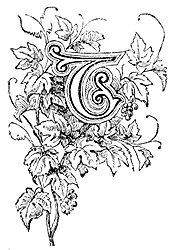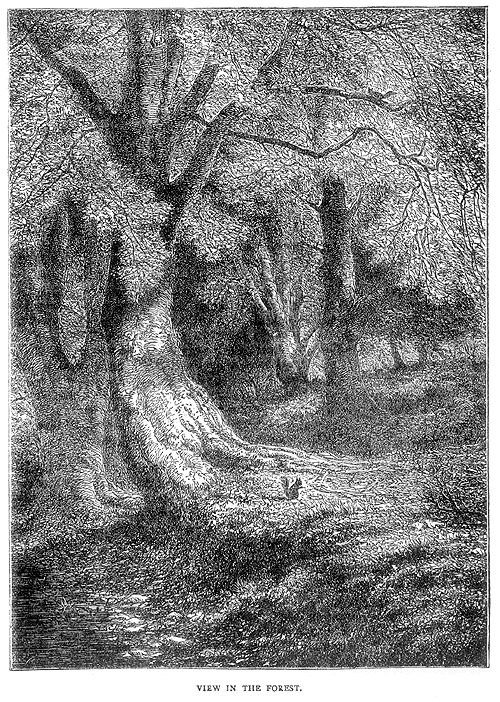 |

HERE is scarcely a lovelier spot in southern England than the New Forest; although of late years it has lost much of its sylvan beauty.
One should see it in the summer. Then, making one's way by the wide and excellent roads that run through it, we may seek a nook beneath the magnificent old trees in the heart of the wood, and rest upon the moss and ferns at their foot. The air is most pure and sweet; the shade of "melancholy boughs" protects us from the glare of the midsummer sun that gilds and brightens the open spots within our view. There is the far-off song of a lark, high above, a soft roulade of coos from the wood-pigeons, a hum of bees, and the trickle, trickle of a rill that passes close by, hidden among the ferns; while the eye rests upon trees that time has crowned with most magnificent beauty.
And yet this glorious greenwood is the product and the memorial of a crime.
England had been conquered by the Norman, and the Conqueror - loving best of all her fair cities the ancient town of Winchester - resolved to make a mighty chase close to his dwelling place. He was not satisfied with the noble woods close by, which had sufficed the Saxon kings; he resolved to have a special one, such as few monarchs possessed so near at hand to their palaces. He therefore doomed to a temporary desolation the district called Itene or Ytchene.
It was already a woodland of great beauty, with tracts of common land covered with turf, golden gorse, and heath, and noble groups of trees and underwood that afforded a harbour to wild animals. But there were churches, manors, and villages in that extent of thirty miles by ninety, which were to form his chase; and all these the will of the savage Norman doomed to destruction. So rapidly was the ruthless order carried out, that very shortly a mighty forest darkened the land, and the traces of human habitation were buried beneath the wild growth of nature. There are names in the forest that still retain some recollection of what was once an inhabited district; Church-place and Church-moor mark the spots where prayer once ascended to God; Thompson's Castle still retains the name of its former owner.
 It was said of William the Norman that he loved wild beasts "as if he were their father," and it seems a true judgment tested by his cruel laws. The slaying of a man might be atoned for by a price; hut he who killed a stag, boar, or even hare, was punished with total blindness. Even his Norman nobles might keep no sporting dogs on their estates unless the fore-paws of the poor animals were mutilated. This law was an exceedingly cruel one at a time when men depended on the chase for much of their subsistence.
But William seems to have brought a curse on himself and his progeny by this act of ruthless selfishness. His second son, Richard, was gored to death by a stag, as he was hunting here; his wife and favourite daughter died soon after, and he met his own death as the consequence of his cruelty to the city of Mantes.
His second son, Rufus, succeeded him, and kept his court at Malwood Keep in 1100, close to the forest in which he intended that same Lammas-tide to hold a chase. Prince Henry, his younger brother, was with him,
The morning of that second of August dawned in unusual splendour. The previous night had been disturbed by Rufus, who had had an awful dream, and v-hose shouts had called his followers to his bedside, where, at his request, they had retained till dawn. Put at breakfast the king was in great spirits the day was come that he had fixed on for the chase, and he had forgotten his dream.
While he was preparing for the hunt, an artizan brought him six new arrows. He praised the workmanship, and, keeping four for himself, he gave the two others to his favourite, Sir Walter Tyrrel, or de Poix, saying, "Good weapons are due to him who knows how to make a good use of them."
And now the horses were at the door, and the huntsman's horn sounded, when a strange monk suddenly appeared and demanded an interview with the king, saying that he had matters of great moment to communicate to him. He was admitted and brought before the Red King. "What would you with me, Sir Priest?" asked William, frowning at the delay.
"King of England," said the monk solemnly, "I bear thee a message from the Norman Abbot of St. Peter's at Gloucester, and thank Heaven - long and weary as the journey has been - I have arrived in time. He warns thee, Sire, not to hunt in the New Forest on this holy Lammas morn; for one of his monks has dreamed a dreadful dream about thee. He saw thee lying dead and bleeding beneath an oak in thy New Forest as the blessed sun was sinking, and assuredly if thou huntest to-day it will be for the last time."
The king's brow clouded; he had had an evil dream himself; but the next moment he shook off the superstitious thrill that was foreign to his godless, fearless nature, and smiled scornfully.
"Monks can dream as it suits them," he said; "I am not a child to be scared by visions. To horse, Walter de Poix (Tyrrel). Do you think I am one of those fools who give up their pleasure or business for such matters ? The man is a true monk. He dreameth for the sake of money. Give him a hundred pence, and bid him dream of better fortune to our person."
In vain the monk entreated and expostulated; the huntsmen followed the royal example, and were soon on horseback galloping off, a noisy company, to the forest.
Once within its shades, they divided about, and by-andby William and Walter Tyrrel were alone.
They had had good sport, when towards sunset a hart came bounding by between the king and his companion, who stood at the moment concealed in opposite thickets.
The king drew his bow, but the string broke, and at the twang the noble beast paused and looked round. The rays of the sun now piercing the trees horizontally were in the king's eyes; he raised his bridle hand to shade them, and cried impatiently, "Shoot, Walter, shoot!"
Tyrrel obeyed, and drew his bow at once. But - was his aim untrue? - the arrow glanced aside from a tiny branch, and striking the king under his raised arm pierced him to the breast, and he fell dead from his horse.
Tyrrel flew to his side, but saw at once that Rufus was dead, and that help was vain. Then a sense of his own danger smote him. To slay a king was a dangerous accident in more ways than one. Who would believe so strange a story ? He would not risk the telling it? He sprang on his steed, spurred it to its utmost speed, gained in safety the seashore, and from thence sought refuge in France, finally going to the Holy Land in expiation of his involuntary treason.
The sun sank; twilight fell on the forest, and still the Red King lay bleeding beneath the oak. A charcoal burner returning from his day's work found the body at last, and putting it into his cart took it to Winchester, where the slain monarch was finally buried.
Kingsley, in his quaint imitation of a ballad of the period, gives a somewhat different version of the story:-
Prince Henry shared in the family love Of sport, but had often been so poor as not to have even a horse to chase the deer, and used to follow it on foot. But now he was friends with Rufus, and had the silver his father had left him, consequently he was able to hunt with the king on that memorable and of August. But being separated from the royal hunt while pursuing his game in a glen of the forest, he, by accident, broke the string of his cross-bow, and seeing a forester's hut near, he went to it to see if he could get it replaced. As he entered an old woman advanced to meet him, and addressed to him in Norman French these lines:-
She then passed swiftly from the hut, and at the same moment Henry heard the cries of those who had found Rufus's body: "The king is killed - the king is dead," and at once springing to his horse rode full speed off to Winchester to seize the royal treasure and obtain the crown. Butewit, the royal treasurer, strove to get there before him and save the treasure for Robert; but Henry won the day, and being chosen king by the Commons, was (on the third day after Rufus's death) crowned King of England.
The old sibyl had doubtless seen the king dead previously. We do not hear if Henry ever saw her again.
The wickedness of William Rufus must have been really as great as the monkish chroniclers represented it to have been, for even in distant Cornwall a legend still exists that proves the universality of the people's belief in it.
Robert, Earl of Moreton, was created Earl of Cornwall by William the Conqueror. He was remarkable for his valour and wisdom, yet he was the especial friend of Rufus. As Earl of Cornwall, he gave St. Michael's Mount to the monks of Mount St. Michael in Normandy, and seized on the Priory of St. Petroc, in Bodmin, for his own use, taking possession of all its lands.
It happened that Robert was hunting in the extensive woods round Bodmin - of which some remains are still to be found in the Glyn Valley - when the following fabulous incident is said to have occurred.
"The chase," says Mr. Gunn, in "Abbeys and Castles," "had been a severe one. A fine old red deer had baffled the huntsmen, and they were dispersed through the intricacies of the forest, the Earl of Cornwall being left alone. He had advanced beyond the shades of the woods on to the moor above them, when he was surprised to see a very large black goat advancing over the plain. As it approached him, which it did rapidly, he saw that it bore on its back 'King Rufus,' all black and naked, and wounded in the midst of his breast. Robert adjured the goat, in the name of the Holy Trinity, to tell what it was he carried so strangely. He answered, 'I am carrying your king to judgment; yea, that tyrant William Rufus, for I am an evil spirit, and the avenger of his malice that he bore to the Church of God. It was I that did cause this slaughter; the proto-martyr of England, St. Albyn, commanding me so to do, who complained to God of him, for his grievous oppression in this isle of Britain which he first hallowed." Having so spoken, the spectre vanished.
"Robert the Earl related the circumstance to his followers, and they shortly after learned that at that very hour William Rufus had been slain in the New Forest by the arrow of Walter Tyrrel."
If this fable is not of later invention than William's time; if Earl Robert really told such a story, it would appear that the fatal arrow was not discharged accidentally, and that Earl Robert knew something about it; but most probably the legend (which is very old) may have originated in the imagination of the people at that time; and mark only the great unpopularity of the second Norman king.
|
 |